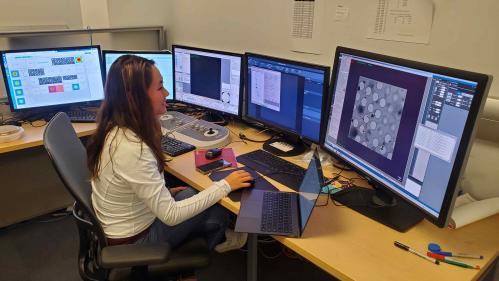Coming to Rutgers–New Brunswick: Greatly Expanded Research Opportunities for Students

A new initiative will open doors to core facilities for participants, bestowing academic credits and certifications
Rutgers University–New Brunswick students will have even more opportunities to participate in trailblazing research, thanks to a program being developed by the Office of the Chancellor.
Known as the Platforms for Education and Research Cores (PERC) initiative, the program is designed to create an entirely new cadre of student researchers at the university. Jean Baum, a Distinguished Professor in the Department of Chemistry and Chemical Biology in the Rutgers School of Arts and Sciences, led the creation of the program during her term as vice provost for life sciences research and partnerships.
Baum did so in collaboration with the Life Sciences Alliance Provost Strategic Task Force, the alliance’s Executive Steering Committee and the Office of the Vice Provost for Research, led by Senior Vice Provost for Research Denise Hien.
In a program under development and expected to be introduced within the next year, participating undergraduate, graduate and postdoctoral students would be mentored by faculty and staff scientists at some of the more than three dozen research core facilities managed by the university and individual faculty members, where advanced devices, such as a cryo-electron microscope to be installed later this year, and supercomputers will allow the exploration of everything from the inner workings of cells to hidden patterns in gargantuan data sets.
Participating students would earn both academic credits and certifications in specified high-technology skills.
“The PERC initiative creates an innovative dimension of research opportunities that will place students squarely at the center of advanced learning environments,” Rutgers–New Brunswick Chancellor Francine Conway said. “They will emerge academically enriched and certified with skills that will give them an enormous edge when applying for jobs or graduate school.”
The initiative also is designed to spark new university-industry collaborations, as part of the plan involves inviting employees working at state industries to be trained and certified at the PERCs.
Baum, members of the Life Sciences Alliance task force and its steering committee, along with the Office of the Vice Provost for Research, conceived the idea of PERCs as a vital component of a new strategic framework re-envisioning research across Rutgers–New Brunswick. The idea, they propose, is to broaden how research cores operate, from those facilities that function to primarily support innovative research to those units that also provide skills-based, experiential learning and digital credentialing for undergraduate students, graduate and postgraduate researchers and community members.
“We envision PERCs to be critical components for both innovative research and platforms for education that will have the potential for increasing research experiences for a diverse student population as well as spurring community and alumni engagement and seeding industry and state-agency partnerships,” said Baum, adding the initiative directly supports the four pillars of the 2022 Rutgers-New Brunswick Academic Master Plan and its goals for national leadership and excellence in education, research and service.
Baum said research core facilities play an integral role in the university’s research infrastructure, empowering investigators to break new ground by offering specialized laboratories with state-of-the-art equipment, unique instrumentation and shared services – all of it managed by scientists with the technical expertise and experience to help others.
The Office of the Vice Provost for Research, working closely with faculty and staff researchers, will develop the campus-wide PERC program over the next year. More information on how to participate will be forthcoming.
“Next steps for the PERC initiative include creating an advisory faculty and staff committee, cataloging the capabilities of the research cores at Rutgers–New Brunswick, building internal and external partnerships and streamlining and developing courses centered on vertical teaching and experiential learning methodology that would bestow digital credentials to participants,” said Sheila Borges Rajguru, the director for research development and strategy in the Office of the Vice Provost for Research.
Under the plan, some research core facilities will be named as PERCs, with their capacity of offering experiential learning to students greatly enhanced.
Among the PERCs will be a new center set to open in October: The Rutgers CryoEM and Nanoimaging Facility. The center will be built around a specialized Krios 300 kilovolt cryo-electron microscope acquired from Thermo Fisher Scientific Inc., a life science and clinical research company.
Centered at Rutgers, the CryoEM facility will be managed by a consortium that includes Cornell University, Rutgers Health and the Waksman Institute of Microbiology.
Baum, who championed the effort, said the acquisition is paramount to maintaining the success of the life sciences research community at Rutgers–New Brunswick as well as essential for leading student training and access, workforce development and community engagement.
As a PERC, the center will make Rutgers–New Brunswick the state leader in training students and postdoctoral fellows to help meet pressing needs for CryoEM expertise, said Stephen K. Burley, University Professor and Henry Rutgers Chair in the Department of Chemistry and Chemical Biology.
“CryoEM is a revolutionary imaging technique that determines the 3D structure of proteins,” said Burley, who is a founding director of the Rutgers Institute for Quantitative Biomedicine. “Such information is vital to learning how macromolecular machines such as proteins work, how they can cause disease and how malfunctioning proteins can be targeted with drugs custom-made to thwart them.”
Developing the PERC program in the coming months is expected to be an exciting process.
“We aim to strategize on ensuring students at all levels gain exposure to the most cutting-edge research core facilities, enabling them to acquire essential technical competencies that will benefit them beyond their tenure at Rutgers,” Borges Rajguru said.




